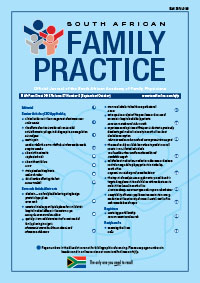From rural scholar to health care professional
Keywords:
academic and social support, health care professional training, rural origin
Abstract
Background: International studies have shown that the best strategy for the long-term staffing of rural facilities is the recruitment and training of students of rural origin. However, the crisis in education in South Africa means that these rural students are the least likely to access institutions of higher learning to train as healthcare professionals (HCPs). The aim of this study was to explore the educational experiences of six HCPs of rural origin working in rural areas. Methods: This was a qualitative study using unstructured interviews supplemented by photomemory and collage development. All interviews were transcribed verbatim and themes were developed. Appropriate ethical permission was obtained prior to the study. Results: HCPs of rural origin found the journey from rural scholar to HCP to be tough. Personality characteristics such as tenacity, determination, problem-solving skills, self-belief and hard work were essential for success — but not sufficient on their own. In addition these HCPs needed social support, academic and social mentoring as well as comprehensive financial support. Conclusions: HCPs of rural origin have the potential to provide long-term staffing for rural hospitals. However, if rural healthcare institutions are serious about finding long-term solutions to their staffing challenges, attention needs to be given to finding and appropriately supporting local scholars. (Full text available online at www.medpharm.tandfonline.com/ojfp) S Afr Fam Pract 2015; DOI: 10.1080/20786190.2015.1071537
Published
2015-08-26
Section
Research Articles
By submitting manuscripts to SAFP, authors of original articles are assigning copyright to the South African Academy of Family Physicians. Copyright of review articles are assigned to the Publisher, Medpharm Publications (Pty) Ltd, unless otherwise specified. Authors may use their own work after publication without written permission, provided they acknowledge the original source. Individuals and academic institutions may freely copy and distribute articles published in SAFP for educational and research purposes without obtaining permission.

